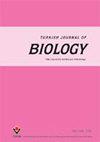一种新型1,4-萘醌衍生化合物诱导乳腺癌细胞凋亡
IF 0.9
4区 生物学
Q3 BIOLOGY
引用次数: 5
摘要
乳腺癌是女性中诊断最多的癌症类型。三阴性亚型是一种特别具有侵袭性的乳腺癌。虽然化疗几乎是治疗三阴性乳腺癌(TNBC)的唯一选择,但考虑到患者的生存率较低,目前使用的化疗药物不够有效。因此,需要开发新的化合物来提高生存率。众所周知,自然界中发现的醌类化合物具有抗菌、抗真菌和抗肿瘤的特性。萘醌类化合物是醌类化合物家族的一员,因其具有良好的性质而被广泛应用于研究中。在这项研究中,我们评估了一种新型萘醌衍生化合物(1,4-萘醌(1,4- nq))对两种不同的乳腺癌细胞的细胞毒活性:激素反应细胞系(MCF-7)和三阴性细胞系(MDA-MB-231)。结果,1,4- nq以剂量依赖的方式降低了两种被测细胞系的细胞活力。在MDA-MB-231细胞中,经该化合物处理后,凋亡标记物(核缩缩、膜联蛋白v阳性、caspase 3/7活性、线粒体膜电位降低)和DNA损伤明显增加。考虑到该化合物有希望的细胞毒性作用,1,4- nq作为治疗TNBC的潜在候选药物需要进一步评估。本文章由计算机程序翻译,如有差异,请以英文原文为准。
A novel 1,4-naphthoquinone-derived compound induces apoptotic cell death in breast cancer cells
Breast cancer is the most-diagnosed cancer type among women. The triple-negative subtype is an especially aggressive type of breast cancer. Although chemotherapy is almost the only option for the treatment of triple-negative breast cancer (TNBC), currently used chemotherapeutics are not effective enough, considering the poor survival rate of patients. Therefore, novel compounds need to be developed to improve survival rates. It has been known that quinonic compounds, which are found in nature, have antibacterial, antifungal, and antitumorigenic properties. Naphthoquinones are members of the quinone family and are widely used in research due to their promising properties. In this study, we evaluated the cytotoxic activity of a novel naphthoquinone-derived compound (1,4-naphthoquinone (1,4-NQ)) against two different breast cancer cells: a hormone-responsive cell line (MCF-7) and a triple-negative cell line (MDA-MB-231). As a result, 1,4-NQ decreased cell viability in both tested cell lines in a dose-dependent manner. Increased apoptotic markers (presence of pyknotic nuclei, annexin-V positivity, caspase 3/7 activity, and decreased mitochondrial membrane potential) and DNA damage were especially observed in MDA-MB-231 cells after treatment with the compound. Considering the promising cytotoxic effect of the compound, 1,4-NQ needs further evaluation as a potential candidate for the treatment of TNBC.
求助全文
通过发布文献求助,成功后即可免费获取论文全文。
去求助
来源期刊

Turkish Journal of Biology
BIOLOGY-
CiteScore
4.60
自引率
0.00%
发文量
20
审稿时长
6-12 weeks
期刊介绍:
The Turkish Journal of Biology is published electronically 6 times a year by the Scientific and Technological
Research Council of Turkey (TÜBİTAK) and accepts English-language manuscripts concerning all kinds of biological
processes including biochemistry and biosynthesis, physiology and metabolism, molecular genetics, molecular biology,
genomics, proteomics, molecular farming, biotechnology/genetic transformation, nanobiotechnology, bioinformatics
and systems biology, cell and developmental biology, stem cell biology, and reproductive biology. Contribution is open
to researchers of all nationalities.
 求助内容:
求助内容: 应助结果提醒方式:
应助结果提醒方式:


